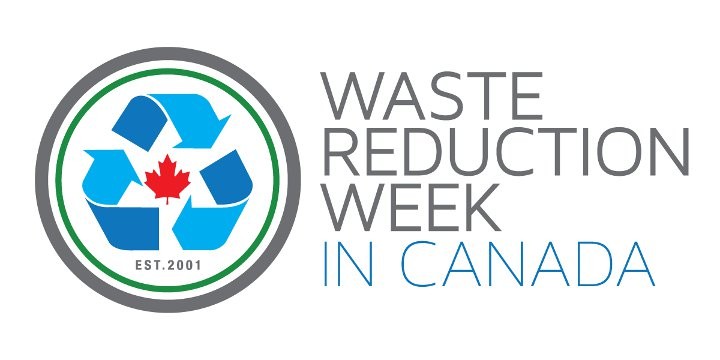Top 10 Take-Action Tips for Waste Reduction Week in Canada

Canadians generate a lot of waste. On average, every Canadian will generate 720 kg (1,587 lbs.) of waste that goes to landfill, which is equal weight to a full grown female giraffe. In the spirit of Waste Reduction Week in Canada here are ten easy take-action tips that will reduce our reliance on landfills and help you adopt more environmentally conscious choices.
1. Buy what you need, eat what you buy, compost the rest
A big refrigerator holds a lot of food, so think twice about how much you load into it. Studies indicate the amount food wasted for each Canadian is 183 kg / 404 lbs. yearly, which is equal to $1,456 being thrown out. Organic waste is also the biggest producer of methane in landfill, which contributes to climate change.
2. Extend the life of clothing
Vintage is the new cool! Give new life to used clothing and get your ‘one of a kind original' by shopping trendy second-hand, thrift, or consignment stores. You can also make your old clothes new for someone else by donating items sitting untouched in your closet.
3. Repair and refurbish
Tears mended, zippers replaced, furniture repurposed, and light fixtures repaired. Not everyone has a home workshop, but maker spaces and tool cafes / libraries are popping up in communities across Canada. These options provide easy access to expertise and expensive tools to help you repair a wide range of items. You can also reduce waste and discover your creative spark!
4. Access over ownership and the sharing economy
When you use Netflix or Spotify you access content without owning anything like CDs and DVDs, which makes you part of the sharing economy. Auto and bike sharing services and libraries maximize the amount of time something is in use, and reduces the amount of material that requires managing once we're done with it. These concepts are key to resource efficiency and waste reduction.
5. Reuse coffee mugs and water bottles
Every year Canadians use more than 5 billion single-use coffee mugs and water bottles. Keep a reusable drinking bottle or mug at work, in your bag, or in the car for easy access. Show your commitment by choosing an establishment that support refill.
6. Reusable bags
Canadians use 3 billion plastic bags every year. The amount of plastic produced from fossil fuels continues to grow, which clogs landfills and litters streets, shorelines, and parks. Using your own reusable bag is a simple change with significant impact. Tuck one in your purse or knapsack for easy access.
7. Skip the straw
These small pieces of plastic have minimal usefulness and are virtually impossible to recycle. Ask bars and restaurants to not include a straw with your drink order. You can extend this by avoiding single-serve and over-packaged plastic cutlery, creamers, salt, pepper, sugar, and condiment packets.
8. Purchase for the environment
Include environmental considerations in your buying decisions and let businesses know it matters. Seek out products with recycled content, or products that can be easily recycled. Consider packaging that is reusable and not disposable. Value companies that offer take-back or repair services of the products you've bought from them.
9. Avoid disposal
We've done our job if there's nothing to throw away, which leaves one last thing to do...
10. Visit wrwcanada.com, and celebrate and take part in Waste Reduction Week in Canada: Oct. 16 -22, 2017.
The Waste Reduction Week Canada website has valuable information and resources to help businesses, communities, schools, and individuals take action on waste reduction. Learn more about innovative companies that are champions in waste reduction; take the Food Waste Pledge; and view or host events in communities across the country.
This article was submitted by the Recycling Council of Ontario.



